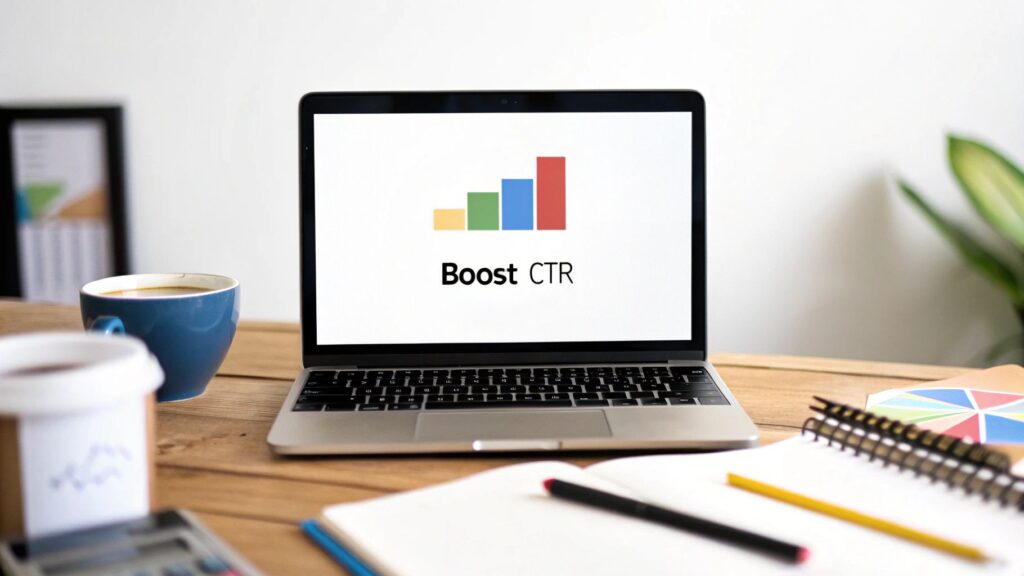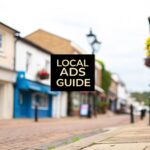When a homeowner has a pipe burst at 2 AM, they aren't looking through old phone books. They're grabbing their phone and searching Google for help, fast. This is where SEO for water damage becomes your best employee. It works 24/7 to make sure your business is the first one they see in a panic.
In this guide, we'll cover how to get your water damage company to the top of Google's local search results.
Why SEO Gets You More Emergency Calls
Forget flyers and old-school advertising. The real action for restoration leads is online. When a disaster hits, people search with an urgency you don't see in other industries.
Searches like "flood cleanup near me" or "emergency water extraction" aren't just casual questions. They are desperate calls for help. Showing up at the top of Google for these terms means you get a phone call and a new job. A good SEO strategy puts you right in front of customers when they need you most.
The Customer Journey Starts with a Google Search
Put yourself in their shoes. They're stressed, their home is being damaged, and they need a professional now. They won't scroll through pages of results. They will call one of the first three businesses in the Google Map Pack or the top few organic listings.
If you’re not on that first page, you're basically invisible for that emergency call.
In Short: Being visible on Google during a water damage emergency isn't just a nice-to-have. It's the main way customers find and hire a restoration company in a crisis.
When homeowners are panicking, they want someone trustworthy, and they want them fast. Your website and Google Business Profile need to show reliability and a quick response from the first glance.
A Growing Market for Restoration Services
The need for restoration services is growing quickly. The global damage restoration market was valued at around USD 13.8 billion in 2024. It's expected to reach USD 22.6 billion by 2033.
More importantly, over 80% of consumers use search engines to find local help after a water damage event. This means your online presence is your most valuable asset. Every search for "burst pipe repair" is a job you either win or lose based on your Google ranking.
Your Water Damage SEO Cheat Sheet
Here are the essential SEO pillars every restoration business needs to master.
| SEO Pillar | What It Does for You | A Key First Step |
|---|---|---|
| Local SEO | Gets you seen in the Google Map Pack for "near me" searches. | Fully optimize your Google Business Profile with services, photos, and hours. |
| On-Page SEO | Tells Google what your website is about and what services you offer. | Use keywords like "emergency water removal" on your service pages. |
| Off-Page SEO | Builds trust with Google and potential customers. | Ask every happy customer to leave a review on your Google profile. |
Mastering these three areas is the foundation for getting more local leads.
People Also Ask About Water Damage SEO
-
How do you get leads for water damage?
The best way is through Local SEO, which helps you show up in Google Maps for emergency searches. You can also run paid Google Ads (PPC) for immediate leads or build relationships with local plumbers and roofers for referrals. -
How do I promote my restoration business?
Focus on dominating your local market. Start by completely filling out your Google Business Profile, consistently getting new 5-star reviews, and creating helpful blog content that answers common customer questions. -
What are the key components of a successful SEO strategy?
A winning strategy has three parts: Local SEO (for Google Maps), On-Page SEO (your website's content and keywords), and Off-Page SEO (customer reviews and links from other local websites).
Win Your Neighborhood with Local SEO
For a water damage company, every single job is local. You’re not trying to rank across the country. You’re fighting to be the first call for a panicked homeowner in your specific town. Winning at SEO for water damage means winning your neighborhood.
Local SEO is your superpower. It sends clear signals to Google that you are the most relevant, trustworthy, and fastest solution for someone searching for help right now.
Your Google Business Profile Is Your #1 Asset
Think of your Google Business Profile (GBP) as your most critical online asset. When a basement is flooding, the first thing people see is the Google Map Pack. Being in the top three is like having the best billboard in town.
Getting your GBP right is non-negotiable.
- Fill Out Everything: Don't skip any sections. Add your hours, define your exact service areas, and select all relevant categories (like "Water Damage Restoration Service").
- Show, Don't Just Tell: Upload high-quality photos of your team, your clean trucks, and your best before-and-after shots. This builds instant trust.
- Answer Questions Proactively: Use the Q&A feature to answer common questions like "Do you work with insurance?" or "Are you available 24/7?"
This infographic shows the customer journey in an emergency.
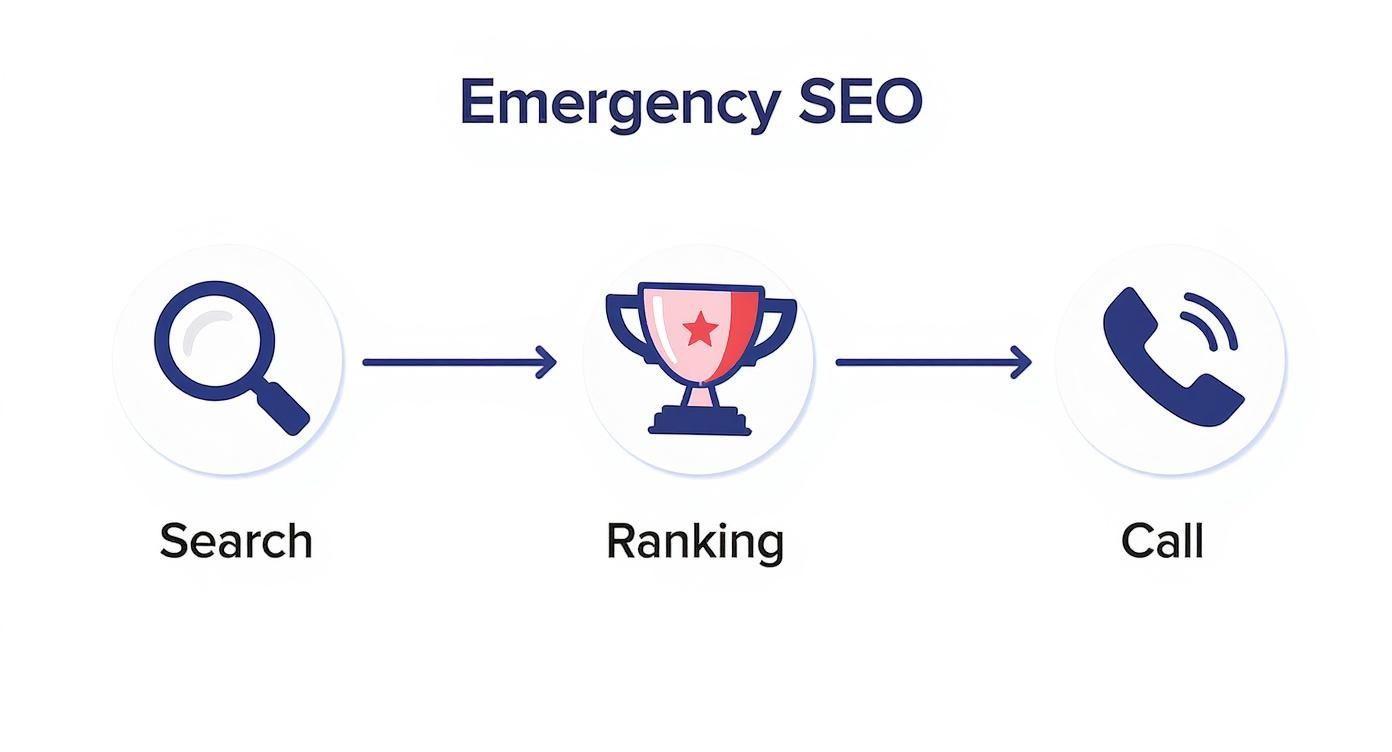
As you can see, a high local ranking connects you with a customer at their exact moment of need.
Consistency Is Key: Your Name, Address, Phone (NAP)
Google loves consistency for local rankings. It needs to see your Name, Address, and Phone number (NAP) listed identically across the web.
If your business is "Springfield Water Pros" on your website but "Springfield Water Professionals Inc." on Yelp, that's a red flag for search engines. It creates confusion. Make sure your NAP is exactly the same everywhere.
Create Hyper-Local Service Pages
Here’s a pro tactic: stop using one generic "Services" page. Create dedicated pages for each specific town or key neighborhood you serve.
Instead of one broad page, build out specific ones like:
- "Basement Flood Cleanup in Springfield": On this page, talk about common basement issues in Springfield homes.
- "Burst Pipe Repair in Shelbyville": Mention local landmarks or the types of plumbing common in Shelbyville.
- "Commercial Water Restoration in Capital City": Target businesses with language that speaks to their unique needs.
These hyper-local pages prove to Google that you're the true expert in that specific area. This makes you more likely to show up for searches from people there. Companies that do this right often see a 25% jump in calls.
In Short: Dominate local SEO by treating your Google Business Profile like your #1 storefront and creating expert content for every neighborhood you serve.
Why Local Citations Still Matter
Citations are just mentions of your business's NAP on other websites. Think of local directories and industry-specific sites. Each consistent citation acts like a vote of confidence for your business in Google's eyes.
A great way to build authority is by creating helpful resources, like a guide on finding the best water damage restoration service near me. This helps customers and boosts your site's SEO value.
Focus on getting your business listed in high-quality directories:
- Industry-Specific: Sites like the IICRC or the Restoration Industry Association.
- Major Aggregators: Yelp, Angi, and the Better Business Bureau.
- Local Directories: Your local Chamber of Commerce or community news sites.
Turn Website Visitors into Emergency Calls
When a pipe bursts, a homeowner is in panic mode. Your website has one job: turn that panic into a phone call to your team, fast. All the SEO traffic in the world is useless if your site can't convert a visitor into a customer.
Think about the user's mindset. They're stressed and need help now. They need a big, obvious button that connects them to a real person. Your goal is to get a visitor from a frantic search to a live conversation in under 30 seconds.
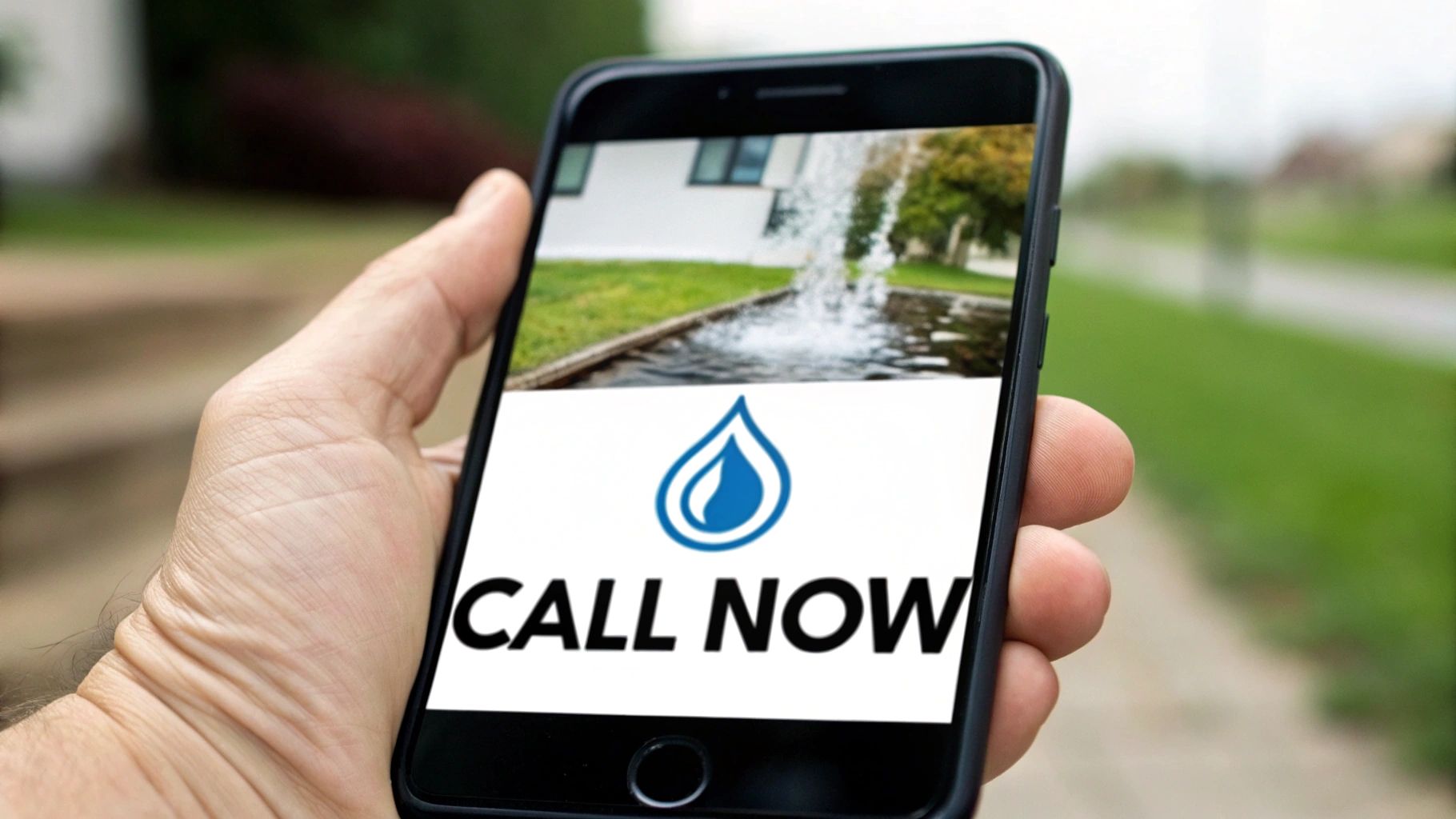
Put Your Phone Number Front and Center
Your phone number needs to be the hero of your website, especially on mobile.
Place the number in the top-right corner of your site's header. Make sure it’s “sticky,” so it stays visible as someone scrolls. Most importantly, it must be a "click-to-call" link. When a mobile user taps it, their phone's dialer should pop up with your number.
In Short: A sticky, click-to-call phone number is the single most powerful conversion tool for a water damage website. It removes all friction for a desperate customer.
Don't just leave it in the header. Weave your number throughout your pages with a clear button like, "Call Now for 24/7 Emergency Service."
Answer Urgent Questions Immediately
A homeowner in crisis has a few critical questions. Your job is to answer them right away.
At the top of your homepage, you need to instantly confirm:
- Are you open? Use phrases like "Available 24/7/365" or "Emergency Service Day or Night."
- Do you serve my area? List your main cities or counties on the homepage.
- Will you deal with my insurance? A simple line like, "We Work Directly With All Insurance Companies," is a huge relief.
- How fast can you get here? Build confidence with a clear promise, like "60-Minute Rapid Response."
By tackling these questions right away, you kill their uncertainty and give them every reason to call you.
Speed and Mobile Design Are Everything
Nearly every emergency search happens on a smartphone. If your site is slow or hard to use on a small screen, you've already lost the job.
Your website must be mobile-first, meaning it's designed for the phone experience first. Think big, thumb-friendly buttons and text you can read without zooming. A great mobile landing page example can show you how to build a page that gets results.
Site speed is just as crucial. A page that takes more than three seconds to load might as well be offline. Use a tool like Google's PageSpeed Insights to see how you stack up.
Create Content That Builds Trust
Great content does more than sell your services—it proves you're the expert. An effective SEO for water damage strategy also means reaching customers before they're in a crisis. This is how you build trust and become a familiar, reliable name.
When a homeowner smells something musty, they go to Google with questions. Your goal is to be the one who answers them.
Answer Questions Before They Become Emergencies
One of the best ways to get on a customer’s radar is by creating helpful, educational content. Think about the common, non-emergency problems homeowners face.
Your blog is the perfect place to tackle topics like these:
- "What Are the First Steps After a Dishwasher Leak?" This positions you as a helpful authority.
- "Why Does My Basement Smell Musty After It Rains?" Explain the signs of hidden moisture and offer a free inspection.
- "How to Prevent Ice Dams and Winter Water Damage": This seasonal content is great for building authority.
By providing real answers, you become a trusted resource. When a small leak becomes a major flood, your company will be the first one they call.
In Short: Blog content that solves minor problems builds brand recognition and trust, ensuring homeowners think of you first in an emergency.
Showcase Your Wins with Case Studies
Nothing builds trust faster than showing real results. Before-and-after case studies are your secret weapon. They let a potential customer see a problem they can relate to and then show them the clean, restored final product.
A powerful case study tells a story:
- The Problem: "A burst pipe in a second-floor bathroom caused extensive water damage."
- The Process: Show your team in action with professional equipment.
- The Result: Post high-quality "after" photos and a happy customer testimonial.
These stories prove you can turn a disaster back to normal, which is exactly what a panicked homeowner needs to see.
Why This Content Strategy Works
Investing in content has a direct impact on your business. It’s not just about looking good online; it’s about generating high-quality leads.
Restoration companies that invest in SEO and content see an average of 50% more qualified leads per month. And as sustainability becomes more important, 45% of restoration businesses now feature their eco-friendly practices in their content. You can learn more about the latest restoration industry trends from R&R Magazine.
Build Trust with Reviews and Local Links
It's one thing to tell Google you're the best. It's another thing when other people say it for you. The next step is all about building authority through reputation (reviews) and local connections (backlinks).
Reviews are your customers vouching for you. Local links are referrals from other respected businesses. Both send powerful signals to search engines that you’re a high-quality company people can trust.
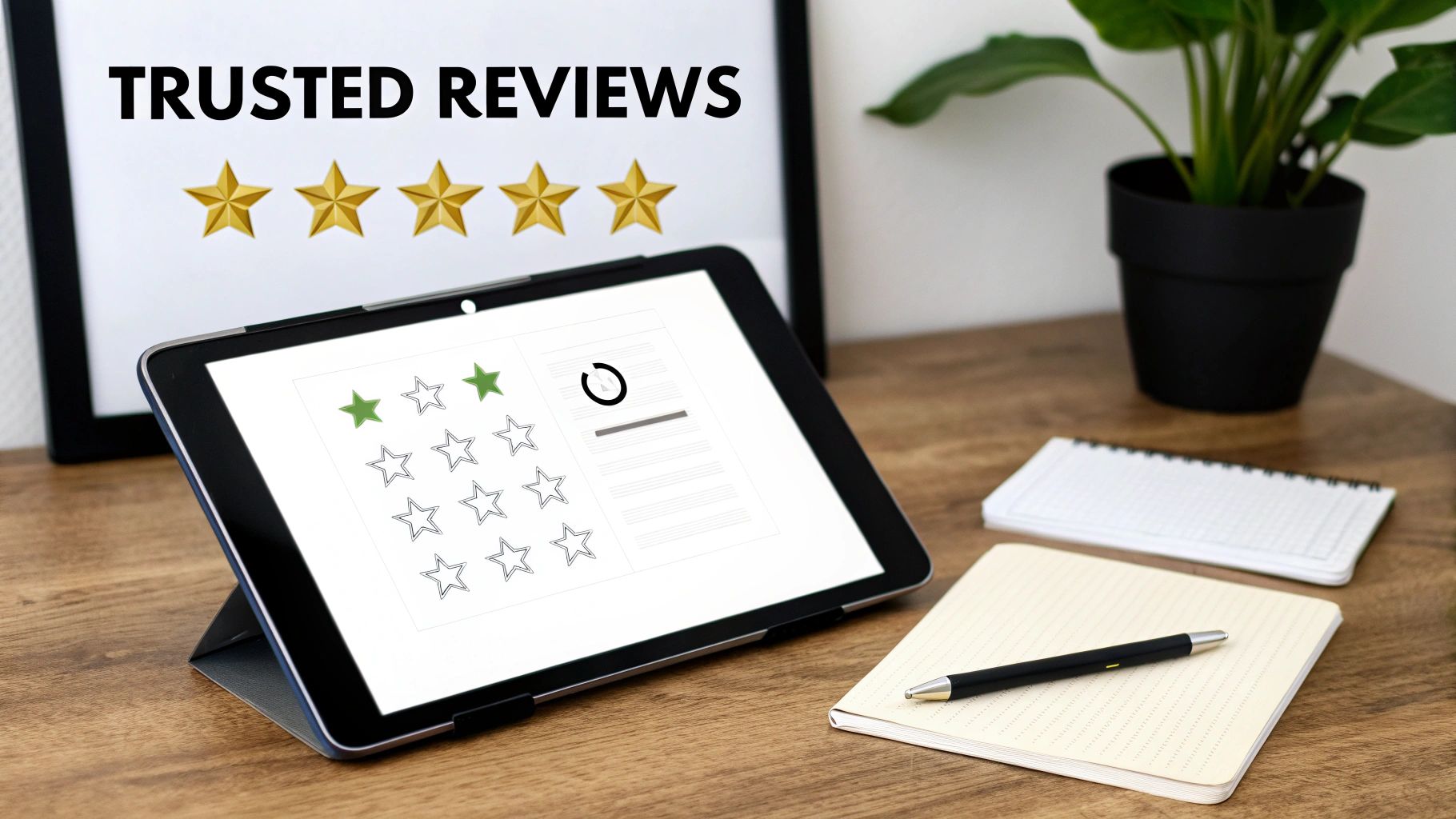
The Power of 5-Star Reviews
Online reviews are gold. A consistent flow of positive Google reviews is one of the most important factors for ranking in the Google Map Pack.
Put yourself in a homeowner's shoes. They see three companies. One has 4.9 stars from 85 reviews. The other has 3 stars from 4 reviews. Who are they calling? It’s an easy choice.
In Short: More high-quality reviews lead to better local rankings, which leads to more phone calls.
So, how do you get them? You ask. Most happy customers are willing to leave a review, but you have to make it easy.
How to Ask for a Google Review
The best time to ask is right after the job is done and the customer is relieved and grateful.
Here’s a simple script your techs can use:
"I'm so glad we could get everything back to normal for you. It would mean a lot to our team if you could take a minute to share your experience on Google. It helps other local homeowners find us when they're in a tough spot."
Then, text them a direct link to your Google review page. This simple step can double or triple your review rate.
What is "Local Link Building?"
A backlink is just a link from someone else's website pointing to yours. When a relevant, trusted local site links to you, some of their credibility passes to your site, boosting your rankings.
The best links come from real-world relationships in your community.
- Your Best Friends: Plumbers & Roofers: These trades are your biggest allies. Ask them to add you to a "Trusted Partners" page on their website with a link to yours. Offer to do the same for them.
- Sponsor a Local Event: Sponsoring a local little league team or town festival almost always gets you a link from their website. This is a great local signal for Google.
- Join the Chamber of Commerce: Most local chambers have an online member directory that will include a link back to your website.
These community-based links are far more valuable for your SEO for water damage efforts than a thousand spammy links.
People Also Ask About Reviews and Backlinks
-
How do you handle a bad review?
Always respond publicly and professionally. Acknowledge their frustration, show empathy, and offer to take the conversation offline to make it right. A thoughtful response can build more trust than a perfect 5-star record. -
How many reviews do I actually need?
It's less about a specific number and more about consistency. Aim for a steady stream of new reviews every month and keep your overall rating above 4.5 stars. A good goal is to have more reviews than your top three competitors in the Map Pack. -
Do links from my Facebook page help my SEO?
Not directly. Links from social media are usually "nofollow," meaning they don't pass SEO authority. However, a strong social media presence is still great for driving traffic to your site and building brand awareness.
Your Water Damage SEO Questions Answered
Getting started with SEO can feel like a lot. We've worked with many water damage companies and hear the same questions over and over. Here are some straight answers.
How Long Does SEO Take to Show Results?
It's a process. You can see quick wins from foundational tasks, like fully optimizing your Google Business Profile, in as little as 1-3 months.
But if you're aiming for the top spots for competitive keywords like "water damage repair [your city]," you need to think longer-term. Getting there and staying there usually takes 6-12 months of consistent effort. SEO is an investment that pays off over time.
In Short: Expect some early results in 1-3 months, but plan on a 6-12 month journey to truly dominate local search results.
What's More Important: Local SEO or "Regular" SEO?
For a restoration business, it's local SEO, all day, every day.
Your customers are searching on their phones for help "near me" or in their specific town. Your number one goal is to own the Google Map Pack and the local results right below it. That’s where the emergency calls come from.
Can I Do SEO Myself for My Restoration Business?
Yes, and you should handle the basics yourself to start.
Here are a few things you can do right now:
- Own Your Google Business Profile: Go through it and fill out every single field.
- Get Your NAP Straight: Make sure your business Name, Address, and Phone number are 100% identical everywhere online.
- Make Reviews a Habit: Create a simple system to ask every happy customer for a Google review.
For more technical tasks like advanced link building and content strategy, it often makes sense to partner with an experienced water damage SEO company.
What Keywords Should a Water Damage Business Use?
Think like a panicked homeowner. Your keywords should reflect that urgency and always be tied to a location.
Use a mix of terms to cover all bases.
-
Urgent & Broad Keywords:
- "emergency flood cleanup [city]"
- "24/7 water restoration near me"
- "water damage repair [county]"
-
Specific Service Keywords:
- "basement sewage cleanup services [city]"
- "burst pipe repair [neighborhood]"
- "commercial water extraction services [city]"
By targeting these types of phrases, you ensure that your business shows up no matter how someone phrases their emergency search.
At Clicks Geek, we specialize in turning your website into a lead-generating machine. If you're ready to get more emergency calls and grow your restoration business, we can help. Schedule your free strategy session with us today!
Is Your Business Ranking in Google Maps?
Turn Google Maps into a Lead Engine w/ Clicks Geek’s AI-powered local SEO. 3,000+ clients served. Our proprietary, fully done-for-you Maps SEO system handles everything—keyword targeting, local optimization, content, reviews, and ranking strategy—automatically.


